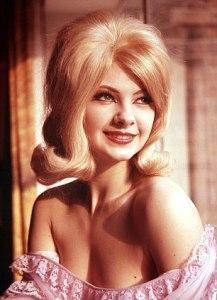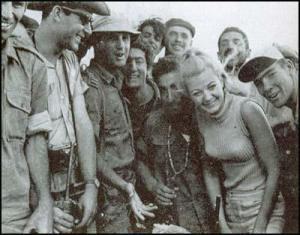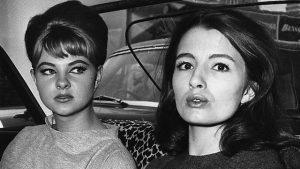Well he would, wouldn’t he? – response when told Lord Astor had denied having her
As I’ve written many times, the maintenance of the Madonna/whore dichotomy demands the erasure of all ambiguity; women must solidly be classified as one or the other, “good” women or “bad”, “empowered” women or “fallen” ones, without a hint that a single woman could play both roles at different parts of her life (much less at the same time). And so women who succeed in other careers after sex work, especially if they’re popular and well-liked, must never ever ever be described as sex workers; they might be dancers, or perhaps masseuses, or models, or even mistresses, but not what they actually were: prostitutes, no different from me or any inhabitant of any red-light district. Of course, it helps when the prostitution is genteel and privately arranged and the whores have other “legitimate” jobs as showgirls or hostesses; then they can be described politely as “party girls” and their clients as “lovers”, and the transactional nature of their “affairs” can be glossed over on the BBC or in polite newspapers.
 Marilyn Rice-Davies was born in Wales on October 21, 1944 and after a fairly conventional upbringing began modeling at 15. After playing a window-dressing part in the film Make Mine Mink, she ran away to London at 16 and quickly got a job as a showgirl at Murray’s Cabaret Club in Soho; there she met and befriended Christine Keeler and the two lived together for a while. Keeler introduced her to the well-connected osteopath Stephen Ward, who both delighted in and profited by introducing ambitious young women like Keeler and Rice-Davies to his wealthy friends. Mandy soon became the mistress of slumlord Peter Rachman, who had previously kept Keeler, but the arrangement ended abruptly with Rachman’s death by heart attack on November 29th, 1962. Rachman was a notorious character who had been under constant police investigation since 1959; he had been prosecuted twice for brothel-keeping and among his expensive gifts to Mandy was a new Jaguar (which was, alas, seized by his widow). But Mandy later insisted that there was no profit motive involved in her relationship with the short, dumpy Rachman, a statement repeated without question by journalists and others ever since.
Marilyn Rice-Davies was born in Wales on October 21, 1944 and after a fairly conventional upbringing began modeling at 15. After playing a window-dressing part in the film Make Mine Mink, she ran away to London at 16 and quickly got a job as a showgirl at Murray’s Cabaret Club in Soho; there she met and befriended Christine Keeler and the two lived together for a while. Keeler introduced her to the well-connected osteopath Stephen Ward, who both delighted in and profited by introducing ambitious young women like Keeler and Rice-Davies to his wealthy friends. Mandy soon became the mistress of slumlord Peter Rachman, who had previously kept Keeler, but the arrangement ended abruptly with Rachman’s death by heart attack on November 29th, 1962. Rachman was a notorious character who had been under constant police investigation since 1959; he had been prosecuted twice for brothel-keeping and among his expensive gifts to Mandy was a new Jaguar (which was, alas, seized by his widow). But Mandy later insisted that there was no profit motive involved in her relationship with the short, dumpy Rachman, a statement repeated without question by journalists and others ever since.
It was after Rachman’s death, however, that Rice-Davies’ ship finally came in, via the Profumo Affair and the associated persecution of Stephen Ward. She had always hoped to achieve stardom, and since coming to London had appeared in several advertisements, but the free publicity afforded her by her appearance as a prosecution witness at Ward’s trial gave her career a mighty boost. This is not to say that she intentionally capitalized upon Ward’s misfortune; in fact, she only agreed to testify after the cops trumped up charges involving a fake ID (and later, a supposedly stolen television set) so she could be threatened with a long stretch in Holloway if she refused to “cooperate”. But once the trial started, she clearly both enjoyed and took advantage of the publicity. The cameras loved her, and her comparing herself to Lady Hamilton (Lord Nelson’s mistress) made her the talk of the papers for a few weeks. After the trial ended with Ward’s suicide at the end of July, Mandy was offered a job as a cabaret singer in Germany and quickly became involved with another wealthy patron, one Baron Cervello.
 For several years she toured the world, taking whatever singing gigs she could find, then in 1966 she moved to Israel; there she met and married nightclub owner Rafael Shaul and converted to Judaism, founding a chain of restaurants and nightclubs called Mandy’s. The couple amicably divorced in 1971 but remained business partners, and Mandy appeared in a number of Israeli films in the ‘70s, then European ones (and television show episodes) in the ‘80s. She also published her autobiography, Mandy, in 1980 and a novel, The Scarlet Thread, in 1989. During this time she had a number of liaisons with ever-wealthier men and an extremely short-lived marriage to the French restaurateur Jean-Charles Lefevre. But it was her third marriage, to British businessman Ken Foreman, which accelerated what she called her “long descent into respectability”; among Foreman’s friends was Sir Denis Thatcher, and Mandy – now going by Marilyn Foreman – is known to have holidayed with Thatcher and his much more famous wife, Margaret. She died of cancer just three weeks ago, on December 18th, and was the subject of laudatory obituaries in the Guardian and Telegraph, among many others.
For several years she toured the world, taking whatever singing gigs she could find, then in 1966 she moved to Israel; there she met and married nightclub owner Rafael Shaul and converted to Judaism, founding a chain of restaurants and nightclubs called Mandy’s. The couple amicably divorced in 1971 but remained business partners, and Mandy appeared in a number of Israeli films in the ‘70s, then European ones (and television show episodes) in the ‘80s. She also published her autobiography, Mandy, in 1980 and a novel, The Scarlet Thread, in 1989. During this time she had a number of liaisons with ever-wealthier men and an extremely short-lived marriage to the French restaurateur Jean-Charles Lefevre. But it was her third marriage, to British businessman Ken Foreman, which accelerated what she called her “long descent into respectability”; among Foreman’s friends was Sir Denis Thatcher, and Mandy – now going by Marilyn Foreman – is known to have holidayed with Thatcher and his much more famous wife, Margaret. She died of cancer just three weeks ago, on December 18th, and was the subject of laudatory obituaries in the Guardian and Telegraph, among many others.
But despite her respectability and long-maintained insistence that she had never really taken money for sex, Mandy never attempted to distance herself from the Prufumo Affair and the Ward trial; in fact, in 2013 she was consulted by Andrew Lloyd Webber for his short-lived stage musical, Stephen Ward. At the time, she revealed that she had not spoken to her old flatmate, Christine Keeler, in over three decades; while Rice-Davies had embraced the publicity and used it to advance her own interests, Keeler had been embarrassed by the whole thing and vanished from the limelight for 20 years after it was over. Their different ways of reacting to the debacle had driven a wedge into what was never a particularly close friendship to start; “I don’t think she liked me,” Mandy said in an October 2013 interview. And though neither of the two ever (publicly) considered themselves sex workers, their very different post-scandal lives demonstrate an important truth about two kinds of women involved in the work: those who consider it to have been a humiliation, and those who embrace it as a means of attaining their goals.
Their different ways of reacting to the debacle had driven a wedge into what was never a particularly close friendship to start; “I don’t think she liked me,” Mandy said in an October 2013 interview. And though neither of the two ever (publicly) considered themselves sex workers, their very different post-scandal lives demonstrate an important truth about two kinds of women involved in the work: those who consider it to have been a humiliation, and those who embrace it as a means of attaining their goals.
(This month’s harlotography first appeared in Cliterati on January 4th; I have modified it slightly for time references and to fit the format of this blog.)
